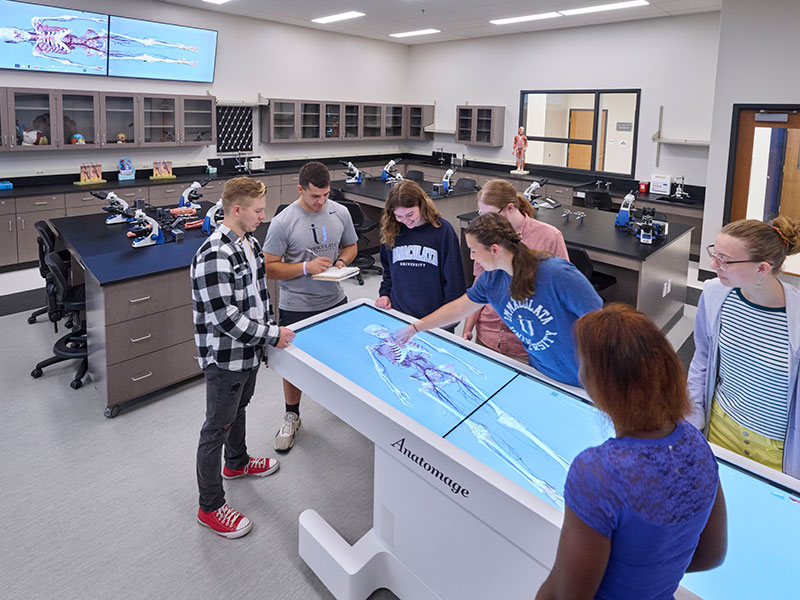Allied Health for Clinical Professionals, B.S.
Become a health care leader and gain skills for better serving patients and your organization.
Enhance your allied health career by earning a bachelor’s degree in as few as two years while working full-time. Immaculata’s Bachelor of Science in Allied Health for Clinical Professionals is a transfer program designed for allied health professionals who have associate degrees and clinical licenses or certifications.
Explore strategies for managing challenges in health care, and become a more valuable health professional by diversifying your skills in areas such as:
- Developing health care teams and fostering strong organizational culture
- Supporting the health care industry’s dual purpose as a public service and a business enterprise
- Promoting effective community relations through public health education and outreach
- Addressing ethical issues in health care
- Communicating in basic Spanish about medical services
- Data modeling, interpretation and math for management decision-making
At A Glance
Program: Bachelor of Science
Audience: Undergraduate adult learners
Format: Online; 7-week sessions
Next Start Date: January 16, 2024
Cost: $465 per credit
Time to Completion Approximately two years, depending on credits transferred
“Immaculata University not only helped me obtain my bachelor’s degree in allied health, but led me towards my career in nuclear medicine. I now work in an outpatient oncology office using clinical trial drugs to treat cancer and find cures for Alzheimer’s and dementia patients. IU’s program was a great fit for me and I wouldn’t be where I am today without the wonderful staff and opportunities that Immaculata offers.”
Austin Jones, CNMT
Career Outlook
Employment in allied health professions is expected to grow much faster than the average for all occupations, according to the Bureau of Labor Statistics. Median salaries include:
- Clinical laboratory technologists and technicians: $57,800
- Diagnostic medical sonographers and cardiovascular technologists and technicians: $75,380
- Nuclear medicine technologists: $78,760
- Radiation therapists: $82,790
- Radiologic technologists and MRI technologists: $61,980
- Respiratory therapists: $61,830
Having a bachelor’s degree will make you a more attractive job candidate and may qualify you for more positions with higher salaries.
- Maximize your previous coursework by transferring up to 72 credits into this program, or earn credit for workplace training through Immaculata’s Credit for Prior Learning program.
- Learn from highly qualified faculty with diverse experience in health care.
- Develop a hypothesis, capstone research proposal and intervention on a subject of your choice.
- Continue your education in Immaculata’s M.S. in Health Care Management.
Lorem Ipsum is simply dummied text of the printing and typesetting industry.
Curriculum
Major Courses (33 Credits)
- Laboratory Science 6 credits
- Leadership in Health Care Settings 3 credits
- Contemporary Issues in Health Care 3 credits
- Health Ethics or Legal & Social Aspects of Health Care 3 credits
- Community Relations in Health Care 3 credits
- Computer Tech and Applications or Business Computer Applications 3 credits
- Math Concepts for Managers I 3 credits
- Capstone Proposal Design 3 credits
- Research & Analysis Using Statistics 3 credits
- Capstone Synthesis & Presentation 3 credits
Liberal Arts Core 36 Credits (3 Fulfilled By Major)
- Composition (Writing) 6 credits
- Natural & Physical World (Lab Science) 3 credits
- Quantitative Reasoning (Mathematics) 3 credits, satisfied by major
- Human Creativity (Art, Literature, Music) 3 credits
- Social Consciousness (Sociology, Psychology, Economics) 3 credits
- Historical Consciousness (History) 3 credits
- Global Society (Foreign Language/Culture) 3 credits
- Pursuit of Faith (Religion, Theology) 6 credits
- Pursuit of Wisdom (Philosophy) 6 credits
Transfer Credits From Clinical Program 30 Credits
Electives 30 Credits
Total 126 Credits
- 30 academic credits within an allied health clinical field from a regionally accredited institution or a program approved by the American Council on Education
- If a state or national exam is required to practice in your clinical field, provide documentation of successful completion of the required exam
- Resume that demonstrates current employment as a practicing clinician, or completion of a training program within the past five years
